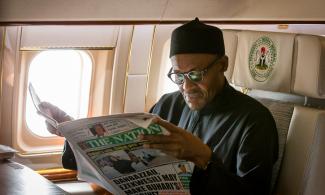
The Buhari administration has ended the controversial practice of routine security vote allocation to top government, military and security officials, SaharaReporters has learned.
Sources in the Finance and Budget ministries also said that the order extends to the President himself, and the Vice President.
In recent decades, security votes became popular among politicians, military officers and public officers, especially presidents and state governors, as a vehicle for siphoning public funds. As the nation became more and more enmeshed in official graft, however, the practice began to generate tremendous public criticism.
Observers say it was a relic from the long years of military rule, but became even more prevalent as from the Second Republic, and assumed a more dramatic and wider form in 1999. Apart from principal federal government officials, state governors and local government chairmen often allocate huge sums of money to their offices as ‘security’ votes, even as the country grew increasingly insecure.
Government sources now confirm that as soon as the Buhari administration took power last year, a clear indication was given of the new direction when President Muhammadu Buhari asked accounting officers in Aso Rock to keep an eye on his own expenses and that of his deputy, noting that they both intended to run a transparent presidency, with zero-tolerance for corruption. Subsequently, the President directed that there would be no routine allocation of security votes to he or anyone else as had been the practice since 1983.
For state governors, security votes often run into billions of Naira annually in many states. While the actual amount that normally goes to the president was always sketchy, there have been clear indications that it runs into several billions of Naira, sometimes on a monthly basis.
For example, under the Goodluck Jonathan presidency, several security vote accounts have been discovered not just in the office of the National Security Adviser, the State Security Service and the military, but also in accounts of the Nigeria National Petroleum Corporation.
In one particular instance, Mr. Jonathan approved a controversial payment of N2.4b in one day for the rent of 13 house boats for the use of the military in Niger Delta under the Joint Task Force Operation Pulo Shield. In the memo for the payment, the former president simply asked the then Petroleum Minister to “release the sum from NNPC security vote.”
The records show that the memo was approved by Mr. Jonathan on February 16, last year. It turned out, according to security sources, that the payment for the rent of the house boats was more than sufficient to actually buy several more house boats. The money was cashed from an NNPC account in Zenith Bank, Maitama, number 023-01571-41-13-4 and paid into the Main Account of the Chief of Naval Staff.
Budget officials say while security chiefs and top civil servants argued for retention of security votes in order to take care of security contingencies, the President cancelled routine vote allocations outright, and cut security votes in the budget by 25%.
This means that the National Security Adviser’s office, the Department of State Security and the Department of Military Intelligence have had their budgets slashed by significant sums to reflect the president’s order to cancel routine allocation of security votes.
A source added that in a similar vein, the President and his deputy no longer receive huge sums of money normally released by the NSA’s office whenever they travel, as was the practice in past governments especially the Jonathan administration.
Sources revealed that in the past when the president or his deputy traveled, not only did they receive routine estacodes, the NSA would bring along loads of hard currency drawn from the security vote, sometimes as much as $50,000 per trip.
On learning of the practice, President Buhari is said to have given firm instructions to stop such practices, providing only that he and the Vice President would only receive civil service rated estacodes and daily travel allowance when they travel abroad, or locally.
A consequence of the new standard is that prominent Nigerians who visit Aso Rock and depart with huge bags or envelopes stacked with money no longer receive such treatment. A source in the presidency said when prominent Nigerians visit the president or his deputy these days, they only get a very warm reception, tea, water, sweets and kolanut, but that no money exchanges hands. Sources said such monies given out to prominent visitors were normally drawn from the security vote allocation.